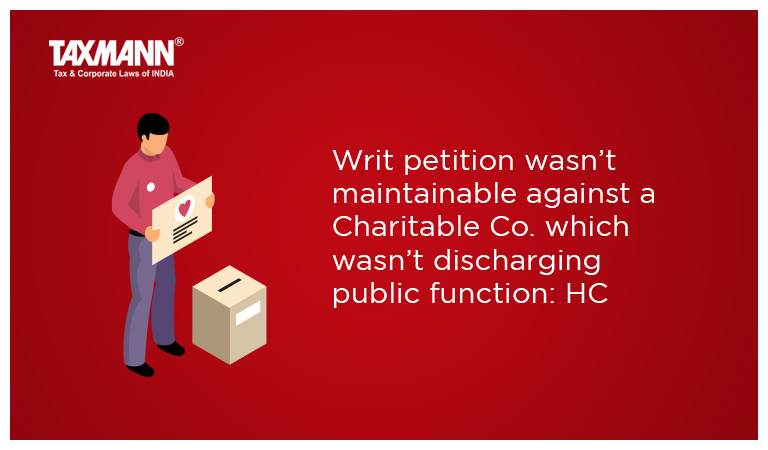Writ petition wasn’t maintainable against a Charitable Co. which wasn’t discharging public function: HC
- Blog|News|Company Law|
- 3 Min Read
- By Taxmann
- |
- Last Updated on 4 August, 2022

Case Details: Surinder Pal Vij v. Gurmeet Singh Baweja - [2022] 140 taxmann.com 457 (HC-Delhi)
Judiciary and Counsel Details
-
- Ms Rekha Palli, J.
- Rajesh Yadav, Sr. Adv., Gaurav Kokar & Lakshay Raheja, Advs. for the Petitioner.
- Adab Singh Kapoor, Ms Shefali Menezes, Pramod Kumar Sharma, Prashant Bajaj, Shekhar Vashisht, Advs., Manish Mohan, CGSC, Devendra Kumar, Adv. & Vedansh Anand, GP for the Respondent.
Facts of the Case
In the instant case, the petitioner was the Managing Director of the company KFMPL and claimed to be a lifetime member of the R4 company, as also a member of its ‘bye-laws committee’. While the R4 was a private company registered u/s 8 of the Companies Act, 2013 having been established, inter alia with the object to protect and promote the interests of persons engaged in the business of motor transport in the country, the R1 and R2 were the Election Officers appointed to conduct elections for the Managing Committee.
Election notice for conducting elections for the post of members of the Managing Committee of the R4 was issued by the R1. Aggrieved by the issuance of the election notice, the petitioner made representations to the R1 and R2 and raised his grievances against the proposed elections. However, he didn’t receive any response from the respondents.
Thereafter, the petitioner approached the High Court assailing the election notices and was seeking a direction for holding the elections strictly in accordance with the Articles of Association of the R4.
However, the respondents contended that the petitioner, not being a member of R4, had no locus to approach the writ Court. Further, the respondents contended that merely because the petitioner was the Managing Director of a company, which was a member of the R4, it would not entitle him to challenge the election thereof and that too, without placing on record any resolution to this effect by KFMPL, of which he was a Managing Director.
In addition to this, the respondents also contended that since the R4 being a purely private body, was only one of the various associations established to cater to the interests of the members of the transport fraternity across India, no writ petition would be maintainable against the R4.
High Court Held
The High Court observed that although the R4 has been established to cater to the interests of transporters and the transport industry, it represents a very small faction of transporters in the country. The R4 was clearly not discharging any public functions and therefore decisions relied upon by the petitioner are not at all applicable to the facts of the present case.
The High Court held that a writ petition is maintainable against a private party if it discharges a public function. However, R4, a charitable company, was one of many organizations existing in the country for the welfare of motor transporters and it had been voluntarily discharging duties for the betterment of the transportation industry, which could by no stretch of imagination be classified as a public duty, R4 was not discharging a public function
Therefore, the writ petition filed by a member of R4 assailing the election process of R4 was not maintainable.
List of Cases Referred to
-
- Ramesh Ahluwalia v. State of Punjab [2012] 12 SCC 361 (para 8)
- Roychan Abraham v. State of U.P. 2019 SCC Online All. 3935 (para 8)
- C. Dhanabal v. Central Registrar of Co-operative Societies, Department of Operation [W.P. (MD) No. 19116 of 2018] (para 8)
- K.K. Saksena v. International Commission on Irrigation and Drainage [2015] 4 SCC 670 (para 11)
- G. Bassi Reddy v. International Crops Research Institute [2003] 4 SCC 225 (para 12).
Disclaimer: The content/information published on the website is only for general information of the user and shall not be construed as legal advice. While the Taxmann has exercised reasonable efforts to ensure the veracity of information/content published, Taxmann shall be under no liability in any manner whatsoever for incorrect information, if any.

Taxmann Publications has a dedicated in-house Research & Editorial Team. This team consists of a team of Chartered Accountants, Company Secretaries, and Lawyers. This team works under the guidance and supervision of editor-in-chief Mr Rakesh Bhargava.
The Research and Editorial Team is responsible for developing reliable and accurate content for the readers. The team follows the six-sigma approach to achieve the benchmark of zero error in its publications and research platforms. The team ensures that the following publication guidelines are thoroughly followed while developing the content:
- The statutory material is obtained only from the authorized and reliable sources
- All the latest developments in the judicial and legislative fields are covered
- Prepare the analytical write-ups on current, controversial, and important issues to help the readers to understand the concept and its implications
- Every content published by Taxmann is complete, accurate and lucid
- All evidence-based statements are supported with proper reference to Section, Circular No., Notification No. or citations
- The golden rules of grammar, style and consistency are thoroughly followed
- Font and size that’s easy to read and remain consistent across all imprint and digital publications are applied



 CA | CS | CMA
CA | CS | CMA
